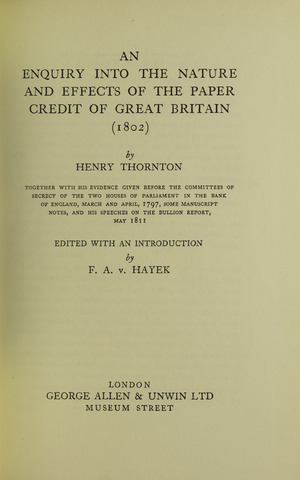Henry Thornton (reformer) facts for kids
Henry Thornton (1760–1815) was an important English economist, banker, and philanthropist. He was also a parliamentarian, meaning he was a member of the British government.
Contents
Henry Thornton's Early Life
Henry was born in 1760 in Clapham, London. His father, John Thornton, was known for supporting the evangelical movement in Britain.
Henry went to school in Wandsworth when he was young. Later, he started working in his cousin's business in 1778. Two years after that, he joined his father's company and became a partner.
Henry Thornton's Career
Becoming a Successful Banker
In 1784, Henry Thornton joined a banking company in London called Down and Free. He later became a partner there. Under his guidance, this company grew into one of the biggest banking firms in London. They also had offices in other cities across Britain.
Serving in Parliament
In 1782, people encouraged Henry Thornton to become a member of Parliament. He wanted to represent Hull. However, he found out that it was common to pay voters to get their support. Henry refused to do this because he believed it was wrong.
Even though he didn't bribe voters, he was elected as a member for Southwark, London, in September 1782. People respected him for his strong morals and honesty.
As an independent MP, Henry often supported the government leaders of his time. He rarely spoke in the House of Commons. Instead, he did a lot of his work by serving on various parliamentary committees. These committees looked into important issues.
Understanding Money and Banking
Henry served on committees that studied public debt and government spending. He also joined the "bullion committee" in 1810. This committee looked at why gold prices were high and how the British currency was doing.
The Bank of England had stopped exchanging paper money for gold in 1797. Henry Thornton wrote the committee's report, which suggested that the Bank should start exchanging gold again. This idea was not popular at the time, but gold payments were finally restored in 1821.
The years between 1797 and 1810 were confusing for the British banking system. This period led to Henry Thornton's most important work as an economist. In 1802, he wrote a book called An Enquiry into the Nature and Effects of the Paper Credit of Great Britain.
In this book, he explained how the British money system worked. He also gave advice on how the Bank of England should manage money to keep the value of the pound stable. This book is still considered very important today.
Henry Thornton: Abolitionist and Reformer
Henry Thornton was a key member of the Clapham Sect. This was a group of evangelical reformers who worked to improve society. He was a strong supporter of the abolition of the slave trade.
He was a close friend and cousin of William Wilberforce, another famous abolitionist. Henry was known as the financial expert behind their many campaigns. He helped fund their efforts for social reform and charity. For many years, Henry and William shared a house where they planned their activities.
In 1791, Henry helped create the Sierra Leone Company. This company aimed to establish a colony in Africa for freed slaves. Henry was a main director of the company and helped manage the colony until the British government took over in 1808.
Henry was also involved in spreading Christian missionary work. He helped found the Church Missionary Society in 1799 and the Bible Society in 1804. He also supported Hannah More in writing and publishing her popular "Cheap Repository tracts," which were simple stories with moral lessons.
He was a pioneer in deaf education. With others, he set up Britain's first free school for deaf students in London. This school, originally called the London Asylum for the Deaf and Dumb, later became The Royal School for Deaf Children Margate.
Henry Thornton's Personal Life
In 1796, Henry Thornton married Marianne Sykes. They had nine children together. Sadly, both Henry and Marianne died in 1815. A family friend, Sir Robert Inglis, adopted their children.
Their oldest child, Marianne Thornton, became a well-known intellectual. She was the subject of a biography written by her cousin, E.M. Forster, a famous novelist. Henry's oldest son, Henry Sykes Thornton, took over the family banking business.
Henry Thornton was buried at St Paul's Church, Clapham. There is a special plaque there that remembers him.
Henry Thornton's Legacy
Henry Thornton was a very successful merchant banker. As an economic thinker, he is sometimes called the "father of the modern central bank." He had advanced ideas about how money and banks should work.
His work on money theory in the 19th century has been praised by modern economists like Friedrich Hayek and John Maynard Keynes. They recognized his forward-thinking ideas, especially his book An Enquiry into the Nature and Effects of the Paper Credit of Great Britain.
Works
- An Inquiry Into the Nature and Effects of the Paper Credit of Great Britain, 1807
See also
- Bank Restriction Act 1797
- Monetary policy
- Sierra Leone Company
- Clapham Sect
- Walter Bagehot
 | Georgia Louise Harris Brown |
 | Julian Abele |
 | Norma Merrick Sklarek |
 | William Sidney Pittman |


